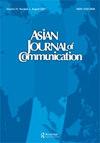韩国报纸对也门难民的报道:使用机器学习技术分析主题和情绪
IF 1.5
2区 文学
Q2 COMMUNICATION
引用次数: 0
摘要
本文旨在实证研究韩国报纸如何定义和报道难民问题。更具体地说,我们通过使用两种机器学习技术-结构主题模型(STM)和变形金刚的双向编码器表示(BERT)来识别也门难民报纸报道中的流行主题和情绪。分析显示,报纸上报道最多的话题是“人道主义居留许可”,即政府是否应该出于人道主义原因发放居留许可,其次是“民族主义”,指的是对接纳更多外国居民而失去“国家身份”的批评和担忧。因此,我们的研究结果表明,地方报纸更有可能报道人道主义居留许可的需求,并传达事实信息,如难民犯罪,而全国性报纸倾向于关注有争议的问题,如“民族主义”。“另一方面,我们发现保守派和自由派报纸在也门难民新闻报道主题上存在差异的证据不足。”这些发现有助于理解媒体如何构建难民问题,并对政策产生影响。本文章由计算机程序翻译,如有差异,请以英文原文为准。
South Korean newspaper coverage of Yemeni refugees: analysis of topics and sentiments using machine learning techniques
This paper aims to empirically investigate how South Korean newspapers define and report refugee issues. More specifically, we identify the prevalent topics and sentiments in the newspaper coverage of Yemeni refugees by using two machine learning techniques—structural topic model (STM) and Bidirectional Encoder Representations from Transformers (BERT). The analyses show that the most prevalent topic covered in the newspapers is ‘Humanitarian residence permit’—whether the government should provide it for humanitarian reasons—, followed by the topic ‘nationalism,’ which refers to criticism and concerns about losing ‘national identity’ by accepting more foreign residents. Hence, our results show that the local newspapers are more likely to report the need for humanitarian stay permits and convey factual information such as refugee crime, while the national newspapers tend to focus on contentious issues such as ‘nationalism.’ On the other hand, we find weak evidence for the difference in covered topics in Yemeni refugee news between conservative and liberal newspapers. The findings contribute to understanding how media frames refugee problems and also have policy implications.
求助全文
通过发布文献求助,成功后即可免费获取论文全文。
去求助
来源期刊

Asian Journal of Communication
COMMUNICATION-
CiteScore
3.70
自引率
0.00%
发文量
38
期刊介绍:
Launched in 1990, Asian Journal of Communication (AJC) is a refereed international publication that provides a venue for high-quality communication scholarship with an Asian focus and perspectives from the region. We aim to highlight research on the systems and processes of communication in the Asia-Pacific region and among Asian communities around the world to a wide international audience. It publishes articles that report empirical studies, develop communication theory, and enhance research methodology. AJC is accepted by and listed in the Social Science Citation Index (SSCI) published by Clarivate Analytics. The journal is housed editorially at the Wee Kim Wee School of Communication and Information at Nanyang Technological University in Singapore, jointly with the Asian Media Information and Communication Centre (AMIC).
 求助内容:
求助内容: 应助结果提醒方式:
应助结果提醒方式:


